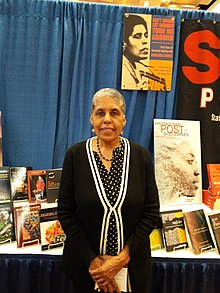Barbara Smith
| Barbara Smith | ||
|---|---|---|
 | ||
| Información personal | ||
| Nacimiento |
16 de diciembre de 1946 (77 años) Cleveland, | |
| Nacionalidad | Estadounidense | |
| Etnia | Afroamericana | |
| Educación | ||
| Educada en | Mount Holyoke College | |
| Información profesional | ||
| Ocupación | Escritora, activista, crítica | |
| Años activa | Inicios de los setenta - presente | |
| Medio | Impreso | |
| Sitio web | ||
| Distinciones |
| |
Barbara Smith (Cleveland, Estados Unidos, 16 de diciembre de 1946) es una activista y escritora estadounidense, defensora de los derechos de la comunidad LGBT. Es una de las mayores exponentes afroamericanas del feminismo en Estados Unidos. A comienzos de los años setenta se desempeñaba como maestra, escritora y defensora de la corriente del feminismo negro.[1] Ha enseñado en numerosos colegios y universidades por los últimos cinco años. Los ensayos y artículos de Smith han aparecido en gran cantidad de publicaciones de prestigio, incluyendo The New York Times, The Black Scholar, Ms., Gay Community News, The Guardian, The Village Voice, Conditions y The Nation. Barbara tiene una hermana gemela, Beverly Smith, que también es una activista lesbiana y escritora.[2]
Fundó junto a Audre Lorde la editorial "Mujeres de Color", especializada en publicaciones escritas por mujeres negras. Su trabajo crítico y editorial en los años setenta y ochenta ha ayudado a mejorar la tradición literaria de las mujeres afroamericanas y a definir el feminismo negro.[3][4]
Bibliografía seleccionada[editar]
- Jones, Alethia and Virginia Eubanks, editors. With Barbara Smith. Ain’t Gonna Let Nobody Turn Me Around: Forth Years of Movement Building with Barbara Smith. Foreword by Robin D. G. Kelley. SUNY Press, 2014.
- Bethel, Lorraine, and Barbara Smith, eds. Conditions: Five, The Black Women's Issue 2, no. 2 (1979).
- Bulkin, Elly, Minnie Bruce Pratt, and Barbara Smith. Yours in Struggle: Three Feminist Perspectives on Anti-Semitism and Racism. Ithaca, N.Y.: Firebrand Books, 1984, 1988.
- Hull, Gloria T., Patricia Bell Scott, and Barbara Smith, eds. All the Women Are White, All the Blacks Are Men, But Some of Us Are Brave: Black Women's Studies. New York: The Feminist Press at The City University of New York, 1982.
- Mankiller, Wilma, Gwendolyn Mink, Marysa Navarro, Barbara Smith, and Gloria Steinem, eds. The Reader's Companion to U.S. Women's History. Boston and New York: Houghton Mifflin, 1998.
- Smith, Barbara, and Beverly Smith. "Across the Kitchen Table: A Sister-to-Sister Dialogue." In Cherríe Moraga and Gloria Anzaldúa, eds, This Bridge Called My Back: Writings by Radical Women of Color. Watertown, Massachusetts: Persephone Press, 1981
- Smith, Barbara. "’Feisty Characters’ and ‘Other People's Causes’: Memories of White Racism and U.S. Feminism." In Rachel Blau DuPlessis and Ann Snitow, eds, The Feminist Memoir Project: Voices from Women's Liberation. New York: Crown Publishing, 1998.
- Smith, Barbara, ed. Home Girls: A Black Feminist Anthology. New York: Kitchen Table: Women of Color Press, 1983.
- Smith, Barbara. Writings on Race, Gender and Freedom: The Truth that Never Hurts. New Jersey: Rutgers University Press, 1998.
- Smith, Barbara. "Where Has Gay Liberation Gone? An Interview with Barbara Smith." In Amy Gluckman and Betsy Reed, eds, Homo Economics: Capitalism, Community, and Lesbian and Gay Life. New York and London: Routledge, 1997.
Referencias[editar]
- ↑ Smith interview by Loretta Ross, Voices of Feminism Oral History Project, pp. 5-6.
- ↑ Smith, Barbara, interview by Loretta Ross, transcript of video recording, May 7, 2003, Voices of Feminism Oral History Project, Sophia Smith Collection, p. 2.
- ↑ Smith interview by Loretta Ross, Voices of Feminism Oral History Project, pp. 3-4.
- ↑ Smith, Barbara. Home Girls: A Black Feminist Anthology, Kitchen Table: Women of Color Press, 1983, ISBN 0-913175-02-1, p. xx, Introduction
Enlaces externos[editar]
- Esta obra contiene una traducción parcial derivada de «Barbara Smith» de Wikipedia en inglés, concretamente de esta versión del 29 de febrero de 2016, publicada por sus editores bajo la Licencia de documentación libre de GNU y la Licencia Creative Commons Atribución-CompartirIgual 4.0 Internacional.
